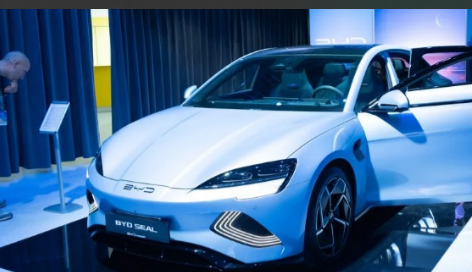Mexico’s Potential Role in Facilitating Entry into the US Market for a Major Chinese Carmaker”

Over 5,000 electric vehicles manufactured by BYD, the Chinese Carmaker backed by Warren Buffett, were loaded onto a colossal shipping carrier in China this week and dispatched to European ports. Surpassing Tesla as the world’s leading seller of electric vehicles (EVs), BYD orchestrated this significant move using the “BYD Explorer No. 1,” a massive vessel, on its maiden voyage from Shenzhen to Germany and the Netherlands.
Chinese Carmaker
This visual spectacle underscores BYD’s growing influence, having conquered the Chinese Carmaker and now seeking to navigate new paths for sustained momentum. Hungary and Mexico emerge as pivotal countries in this endeavor, serving as gateways to Europe and North America, respectively. Despite their relatively modest car markets, these nations play a crucial role in BYD’s pursuit of becoming a globally recognized brand.
BYD has already initiated efforts in both countries. In December, it committed to establishing a factory in Hungary, marking its first production plant for passenger cars in Europe. This significant investment, supported by Prime Minister Viktor Orbán’s government, positions Hungary as a key manufacturing hub, providing trade access not only to Hungary but also to 26 other European Union member states.
Similarly, BYD is exploring opportunities in Mexico, expressing interest in building a plant in the southeastern state of Yucatán. While plans are not officially confirmed as of January, analysts foresee Mexico serving as an entry point for manufacturing and exporting into North America.
Experts believe that these strategic expansions into Hungary and Mexico will enable BYD to establish strong footholds on both sides of the Atlantic while circumventing substantial tariffs. This proactive approach also helps BYD navigate geopolitical challenges, especially amid increasing scrutiny of Chinese EVs by some European politicians.
The moves into Hungary and Mexico are not merely reactive to protectionist measures; instead, they align with BYD’s broader global expansion and manufacturing goals. With ambitions for global domination, BYD aims to create a sustainable enterprise that goes beyond adapting to regional trade dynamics.
The new plant in Hungary, situated in Szeged, is strategically timed to allow BYD to avoid European tariffs on cars imported from China, which are expected to increase following an ongoing EU investigation into China’s state support for EV makers. Similarly, setting up production in Mexico aligns with the requirements of the United States-Mexico-Canada Agreement (USMCA), offering BYD an attractive base for manufacturing and exporting to North America.
BYD’s trajectory, from a relatively unknown brand overseas to surpassing industry giants like Tesla, demonstrates its commitment to global growth. While initially prioritizing the Chinese market, BYD has now expanded its presence to over 70 countries. The company’s overseas production facilities, in locations such as California and Brazil, coupled with plans for new plants in Indonesia, Thailand, and Uzbekistan, showcase its commitment to a localized approach.
As BYD continues its aggressive growth in exports and overseas expansion, analysts emphasize the importance of building factories near key markets. This not only demonstrates a commitment to creating local jobs but also fosters goodwill and potentially secures favorable treatment from governments in those regions. BYD’s journey from a Chinese battery maker to a global EV leader exemplifies its strategic vision and determination to become a dominant force in the electric vehicle market worldwide.




